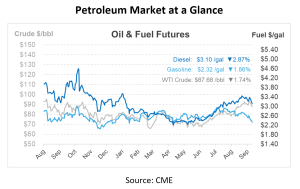
What Is It – Exception Reporting
In today’s fast-paced and increasingly digital world, fleet managers face a number of challenges, with fuel card fraud emerging as a critical concern. As fraudulent activities evolve, it’s important to leverage advanced tools for robust oversight of fleet activities. Today, we’re focusing on a potential solution in the current climate of increased fuel card fraud: exception reporting for fleet cards.
What is Exception Reporting?
Exception Reporting is a specialized feature in fleet management that flags and reports transactions that occur outside of predefined parameters set by fleet managers. These parameters can range from spending limits, fuel types, geographic locations, and even time frames within which purchases are allowed.
Exception reporting gives fleet managers the peace of mind that comes from knowing all transactions are monitored in real time, with the added benefit of having a dedicated team to resolve any issues that arise.
The Rise of Fleet Card Fraud
Unfortunately, we live in times where fraud, especially concerning fleet cards, is on the rise. From card skimming to data breaches, fuel card fraud can have devastating impacts on businesses. It’s not just about the money lost in fraudulent transactions but also the cost incurred to fix the broken systems and reputations.
Monitoring Anomalies and Setting Parameters
At the core of exception reporting is the ability to immediately spot anomalies. Imagine getting notified the moment a fuel card is used to make a non-fuel purchase or if there’s a purchase made outside of business hours. This kind of immediate alerting is critical to stop fraudulent activity in its tracks. Have a fleet of gasoline-only vehicles? A diesel purchase exception can raise immediate red flags.
Setting the right parameters is key. Managers have the flexibility to define what counts as “normal” or “optimal” activity for their fleet cards. These parameters, which can be adjusted for daily, weekly, or monthly data intake, serve as a benchmark for incoming transactions. Transactions that deviate from these guidelines are instantly flagged as suspicious.
Fine-tuning your parameters to your fleet’s needs can prevent costly mistakes such as filling up a vehicle with the wrong type of fuel. Observing fluctuations or trends outside of the normal range can offer valuable insights into fuel purchasing patterns over time. By carefully defining these parameters, you’re not just implementing an additional layer of security but also paving the way for more efficient and data-driven fleet management.
Benefits of Exception Reporting
While these reports help you keep track of what’s going smoothly, their real strength lies in flagging anomalies, compliance issues, and potential problems. Here are three compelling reasons to incorporate exception reporting in your fleet management:
Boost Accountability
Exception reports meticulously document a variety of actions, from minor mistakes to more significant issues like overages or missing inventory. Once you receive an alert about an anomaly, you have the data to dissect the situation and come up with targeted solutions. This deep-dive capability ensures that accountability is consistently maintained.
Foster Transparency
Uniform understanding between drivers and managers about the rules and security measures, including exception reporting, minimizes the risks of internal theft and negligence. The comprehensive trail of activities laid out by these reports makes it easier to identify responsible parties when things go awry. Overall, the visibility provided by exception reporting encourages your team to be meticulous and transparent.
Deter Misuse
Exception reports can spotlight recurrent issues tied to individual drivers, allowing for targeted coaching. While not a real-time alert system like a fraud report, exception reporting serves as a secondary line of defense against issues such as stolen or skimmed cards.
At Mansfield, we employ advanced data analytics to enhance the security and efficiency of your fleet operations. In these challenging times, we remain committed to providing you with the best tools and support to manage and protect your fleet. If you want to learn more about how Mansfield can help you get started with exception reporting, please visit our website or call 866-275-7338.

This article is part of Daily Market News & Insights
Tagged:
MARKET CONDITION REPORT - DISCLAIMER
The information contained herein is derived from sources believed to be reliable; however, this information is not guaranteed as to its accuracy or completeness. Furthermore, no responsibility is assumed for use of this material and no express or implied warranties or guarantees are made. This material and any view or comment expressed herein are provided for informational purposes only and should not be construed in any way as an inducement or recommendation to buy or sell products, commodity futures or options contracts.





